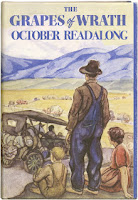First, things are awful in California. Of course EVERYONE has been telling the Joads that pretty much since they left, so, yeah.

We also lose a couple more people because the family is falling apart. But this time no one dies which is an improvement? Maybe. Casy goes to jail after a skirmish at the campsite, presumably never to be heard from again. A man tries to ensure fair wages which equals COMMUNIST so the police are called in, and they proceed to shoot a lady in the hand. Tom trips the cop and Casy knocks him unconscious. And since Tom is on parole* Casy takes the blame and is happy to be hauled away having helped the family. We the readers, on the other hand, have lost another one of the better characters. Dammit Steinbeck.
Connie also wanders off, I guess as he attempts to walk back to Oklahoma? I don't think he really got the details worked out apart from "Screw California. I'm going home." I'm sure he'll be a real success back at home after taking some classes.

Last time the family chapters were super depressing and the in between/vignette chapters had the hope (Mae & her penny candy). This time the Joad chapters have the little ray of hope and the vignettes offer up the taste of everything that's awful. There's a chapter where they talk about how farming has become an industry and a business, how the land and the crops don't matter except to the bottom line, how the people who are hired to gather the food are imported in, treated like slaves, and deported when no longer needed. How food is left rot while people are starving because it's too expensive to actually pick it. It's unfortunate how much of this is still true today. Sorry Steinbeck, your dreams of sharing and caring have not come true.
So how much more depressing can this get?

*How would they check that he's on parole in Oklahoma out in California? It's not like now where there are computers and the CA cops can check the guy out in a database. How would they find this out?
Title quote from page 316
Steinbeck, John. The Grapes of Wrath. Penguin, 1992. Originally published 1939.

